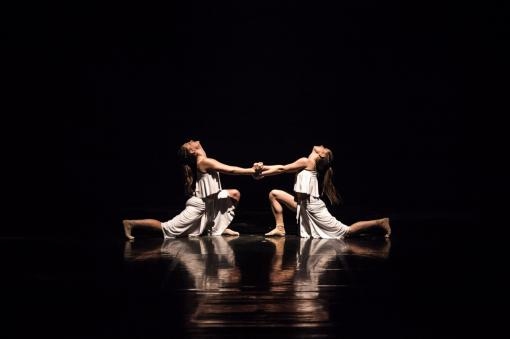For what is already the sixth time the National Theatre Brno has presented promising choreographers from among its own ranks. Yesterday in the Reduta Theatre there was the premiere of another year of the unusual project entitled Choreographic Studio. Nine mini productions were performed by soloists and members of the company to their own choreography.
The dancers began the evening untraditionally from the end – a storm of applause and a proud curtain call. Sejdeme se na děkovačce (We Will Meet at the Curtain Call) by Martin Svobodník caricatures the professional code in contrast with disgust and professional burnout, hidden behind the stiff masks of the dancers, and perhaps with the viewer’s own frustration with social convention. I cannot help but have wry smile (and compliment the author) that the introductory curtain call is also poking fun at the audience a little – when you convince them to applaud anything (even if they have not yet seen anything). However I believe the Brno’s audiences have a sense of humour and knowingly allowed themselves to be led into giving exaggerated applause.
The soloist Uladzimir Ivanou chose a more serious theme for his choreography. He told of the relationship between men and women, of the unified but often opposite poles of their long common path. His choreographic experience was clear as was the perfect harmony with Elizaveta Shibaeva. On the stage this pair was accompanied by a projection, which together with the harmonically not very imaginative composition by Hans Zimmer came across as even a bit pathetic. However the soloists danced to the very tender, sincere and propitiatory choreography with urgent passion.
The Austrian dancer Gregor Giselbrecht chose the famous Mácha’s May. It is surprising with what softness, movement and visual sensitivity he captured this jewel of Czech poetry. However it was not about a celebration of nature in spring, but a tale of love, murder and guilt. Selected spoken parts (with an exceptional recitation by Rudolf Hrušinský) were supplemented by the music of Franz Liszt, written in the same period as Mácha’s poem. Although paradoxically coming from very different cultural contexts, the choreographer’s choice was appropriate. Giselbrecht’s choreography does not go for exaggerated gestures and expressivity, and even the brutal motifs of violent acts of the aggressive behaviour of the dancer were not overly emphasised by overdone effects. The cruelty of Vilém’s father (Ryunosuke Ishikawa), the death of Jarmila (Kateřina Matonohová), the tenderness, anger and revengefulness of Vilém (Peter Lerant) are all danced with convincing expression by the interpreters.
The choreographers Anita Glosová and Kateřina Nováčková are a coordinated and experienced duo. For their part with the name Bosques vía temperley this time they took the theme of relations between partners. On stage they articulated an impressionistic story about how partnership affects relationships between us and with ourselves. They offered their own possible interpretation and personal projection.
Individual inputs peppered the “lectures” of Doctor Bělíková and Associate Professor Slobodník. With the help of demonstrations of so-called “hankovky” and with unforced jokes they parodied for example the former artistic head of the company. The theme of humour was also kept by Nelka Lazović. In the cabaret production Co by kdyby (What If) she had the dancers in the role of servants fantasise about being able to stop time. In their spectacular costumes she had the maids (Tiffany Byrd, Elizaveta Shibavea and Demi Trezona danced and played brilliantly) switch over through the control of the gramophone to their own dreams.
In Barbora Bielková’s staging the circle of life turns a black widow into an ordinary woman. She put Kristýna Kmentová into the role of the black widow. She was absolutely convincing, in the first part the outstanding choreography underlined the seduction of the male (Valér Somai), whose head she then unceremoniously bit off. There were even humorous passages, when playfully toying with the head as a trophy.
A date can lead to a relationship or to deep trauma, as Emilia Vuorio convinces us in his choreography. In a dubious dive a nervous young man (Martin Svobodník) and a sweet girl (Anita Glosová) meet over stale wine and the date does not go well. Vuorio and the pair of dancers however managed a very comical and attractive dance number up to the last bow before the entertained audience.
A stereotypical view of women and men was staged by Carolina Isach Cogollos. Three scantily-clad ballerinas have a beauty contest, collaborate and then slander each other and fight over men. Although in the theme Isach strikingly reminded us of the production Maskuline/Feminine by Lukáš Timulák, it deserves appreciation for its own language and originality, despite the stale cliché.
The evening closed with Svobodník’s Sešli jsme se na děkovačce… (We Met at the Curtain Call…). It mocked the stiff thank-yous of the staging team and the crowd showing off in the foyer. Despite the audience’s ovation none of the dancers and choreographers came to bow – after all the curtain call had already been at the beginning.
A theatre that has the adjective ‘National’ in its name takes pride in the great works of the world’s choreographers, but it is of course also important that it gives regular opportunities for the creativity of artists from its own ranks. The Choreographic Studio provides a parade of the best that the members of the company could offer – in terms of choreographic invention, visualisation (the wonderful costumes for example were designed by Petra Říhová) and cooperation. Precise staging and performances with seriousness and exaggeration, and especially with great enthusiasm are just what we want to see.
Sejdeme se na děkovačce, Sešli jsme se na děkovačce… - Martin Svobodník; Continuum - Uladzimir Ivanou; Máj – Gregor Giselbrecht; Bosques vía temperley – Anita Glosová and Kateřina Nováčková; Co by kdyby – Nelka Lazović; Mrs Mactans – Barbora Bielková; The Date – Emilia Vurio; Teatro – Carolina Isach Cogollos.
The Ballet Company of the National Theatre Brno, Choreographic Studio. Premiere 18 January 2018.
































No comment added yet..